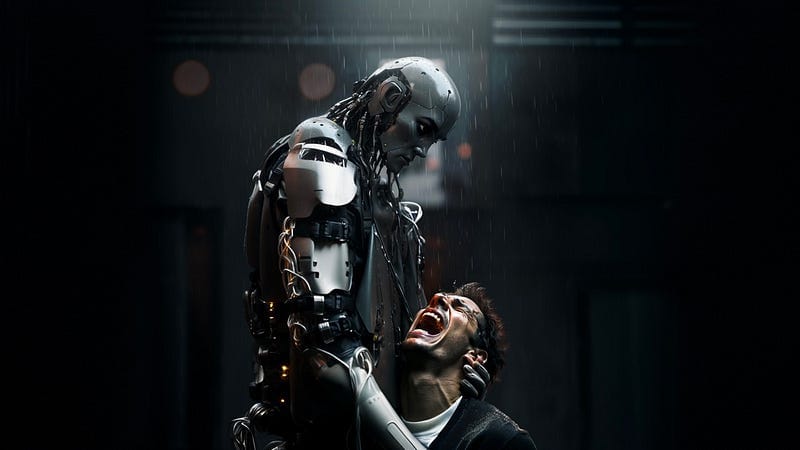Dominion Over the Machines
all humans may have more control of how machines are used

all humans may have more control of how machines are used
For I believe the first time in human history, a labor union contract says both workers are human, and also the union shall negotiate with the employer before a non-human substitute is used. That is if the actors union SAG-AFTRA ratifies the tentative agreement they have for a new contract covering TV and film performance. [update: On December 5, 2023 the tentative agreement ratified and become the new active contract.]
People performing are human, and the union gets to cover humans and non-human substitutes.
This is a big deal.
This agreement may also help as-of-now-unwritten laws, court decisions, regulations and treaties further establish people own their own likenesses and voices and should have control of them.
In previous centuries, when textile workers (the Luddites) couldn’t get anyone to agree to use no automated looms and no other machines to do their work, they were out of options. The actors union could not get companies that make film and TV to agree to never use synthetic actors. It simply would not happen, no matter how much anyone may want it to. But unlike those Luddites of the past, pending ratification, SAG-AFTRA will have a voice in how, when and in what ways synthetic actors are used.
And next year when the contract for entertainment transportation is up for renewal for the Teamsters, they might be able to get their union involved in what the use of automated driving machines looks like, if they can build on the example a SAG-AFTRA contract gives of the union having standing to be involved in and to negotiate around the use of synthetic performers. International Alliance of Theatrical Stage Employees (IATSE) too, if the tentative agreement is ratified, can build on the ground work of the SAG-AFTRA contract to engage with any automation they cannot stop completely. And so too can the American Federation of Musicians (AFM) this January when they begin negotiating their contract.
This helps entertainment and other industries as it sets a precedent. Even can in textiles too, and the original Luddites might find that intriguing.
All unions may be able to follow similar paths far beyond entertainment. Employees may be able to focus the use of machines toward amplifying employees’ abilities instead of just un-employing employees. Maybe instead of cutting your human workforce in half, you keep all the humans and with artificial intelligence (AI) make them twice as effective, twice as capable and the company gets to do the work better, and do more work. The WGA’s new contract is working to do just that by allowing writers to use AI but forbidding writers from losing out to unmitigated AI. Human workers, working together, can be able to influence how machines replacing them at work are used. Humans may have a voice with how the robotic work happens.
This may help all humans everywhere have more say in how machines work in their place (or how machines work with them). This actors union’s tentative agreement may help all people everywhere have more control over how machines can pretend to be them too. This can be a good step forward for everyone. All people benefit from that.
Impersonation by technology is not just a threat to politicians and performers. Getting a convincing video call that appears to be from a loved one can be damaging, and everyone may be at risk of such manipulations at the hands of the ill-intended sooner than we’d all like to be. And that’s just one scenario. Your bank thinking you are calling and giving them instructions, when it is not in fact you calling, is another.
Technology pretending to be people can be very destructive. Guardrails around what can and cannot be done with synthetic performers today in entertainment can help support more safety around synthetic versions of all of us, everywhere, tomorrow.
Even aside from the real and unnerving philosophical reality of technology distorting what it means to be human, the practical impacts of this tentative agreement for SAG-AFTRA can be something that makes automation less disruptive going forward, less disruptive than it has been in the past. The future can be better than what we can easily imagine; doomsday does not need to come.
The genie of artificial intelligence is not going back in the bottle. Even if we want AI to go away forever, the fact is: for most of the planet the option to never have an AI in our lives is no longer available. But the possibility of making real safeguards around AI that benefit everyone (including the companies), with the participation of the workers that AI may most dispossess is huge.
Technology has been disruptive since the discovery of fire and the invention of the wheel. But with the participation of humans who do the work, perhaps the damage of machines doing the work instead of humans can be lessened. Maybe it can even be softened completely to the benefit the companies and their workforces. Everyone can come out ahead. The world is not a zero-sum place and neither does technology have to take something away from one group of people to give something else to another group of people. Destructive disruptions being exchanged for more productive disruptions is a good thing. This may be optimistic of me, and events beyond the SAG-AFTRA deal will have to happen well too, but the path forward, for all sides, can be better.
Previously, workers resorted to various tactics, like sabotage (the origin of the word “sabotage” comes from the French word “sabot” meaning “clog” after stories of mill workers throwing their wooden clogs into machines to break the machines). This tentative agreement paves a new avenue for employees to have their unions sit at the table and negotiate over the work non-humans do. It’s a much more gentle, and probably much more effective, way forward. It is better for the companies too. Despite the counterproductive Victorian-era labor relations tactics CEOs too often use today (unforced errors that harm their own companies), in the 21st Century companies working with their employees are healthier than companies working against them.
Sure, people are distrustful, and employees can imagine with good reason that their unions can be compromised by companies. Like the entertainment union IATSE was compromised in the last century by the mob (starting in paragraph 2 of The War for Warner Brothers on IATSE local 728’s site there is background on that mob activity). So surely rigorous and well thought out moves need to be made in addition to any contract SAG-AFTRA adopts.
A lot has to go well for things to work well. And disruptively, non-humans have taken humans jobs for centuries. But to have a real chance to influence and help shape how non-human workers take human jobs is a move forward for human workers, and the SAG-AFTRA tentative agreement opens a way for this to happen. It’s a massive opportunity, even though it’s not a panacea that solves everything.
No human wants a job they wanted to keep to be taken away by a machine. There may not be a way to stop that in all cases from ever happening to anyone.
And universal basic income (UBI) has been suggested as a necessity in the face of AI to both allow displaced humans to afford things and for the world to be able to have people capable of making purchases in its economy. If everyone loses their jobs to AI, the things AI makes won’t sell. UBI might be needed to fill in people’s incomes if machines take all their jobs.
Now I’m not sure we need to game this all out here, but if unions can negotiate how non-humans do work, and those non-humans take union members’ jobs away, is it such a stretch to think compensation for the soon-to-be unemployed/less employed humans naturally becomes part of the negotiations before the non-humans go to work? Not much of a stretch at all. In the end, the machines may not be less expensive or easier to hire than humans.
Some have said this tentative agreement opens the door, but doesn’t walk far enough through the door. In a moment of calm, which has recently been hard to find in online discussions about this, I think every person who supports this tentative agreement for SAG-AFTRA would agree with the following right along with people who decry the tentative agreement: we need more than just this going forward. Sadly, the CEOs stubbornly and self-destructively refuse to give what even they need their workers to have. They refuse so far. This agreement, if ratified, is for 2.5 years. We cannot stay where this agreement puts us for long. We don’t have to and we aren’t.
Happily, there is real progress beyond this agreement already. Movement on new laws, like the NO FAKES act now being purposed in the US Senate (1 pager PDF here), is happening now. And the new WGA contract built on the Directors Guild of America (DGA) contract, and the SAG-AFTRA tentative agreement which is building on the WGA contract, are all proof progress has been made. Progress may not be as fast as we’d like to solidify protections, but it is coming. Currently, the SAG-AFTRA interactive media (video game) agreement is in negotiations and can build on these earlier agreements made this year, especially if the possibilities of the film/TV tentative agreement become a contract that establishes itself as the floor for the interactive agreement negotiations.
Next year the AFM, IATSE and Teamster contracts can also move everyone forward, even as they move themselves forward. The U.S. Copyright Office and the Federal Trade Commission (FTC) sought comments earlier this year about the impacts of AI and machine learning on peoples’ work and lives. Both agencies regulate a lot of the issues individuals and businesses face, and are likely to reformulate regulations based in part on those comments. The European Union approved the E.U. AI Act recently, a set of regulations to “ensure a high level of protection of health, safety, fundamental rights, democracy and rule of law and the environment from harmful effects of [AI].”
Already contracts, laws, regulations and international agreements are all moving toward securing more safety and fairness around AI.
And the film/TV tentative agreement SAG-AFTRA’s members are currently considering advances things in this new and crucial way, if it becomes the contract. It allows employees to have more of a hand in how non-humans do work. We can have more of a hand than anyone has ever had before.
And that might include humans doing work far easier and affordably for companies than non-humans’ work will ever be. That is, after all, the union’s intention behind what they got the CEOs to agree to put into the tentative agreement. The chance to affect what non-human workers can and cannot do, and how much it may cost, is progress that every other contract, law, court decision and treaty can build on. The tentative agreement’s provisions for the union to be involved in the negotiations before the use of a synthetic performer is like a wrench being thrown into companies’ plan to replace workers with machines in one easy move. Humans who work will be involved in decisions about how non-humans are used, if it’s ratified. In addition to other gains and protections in the tentative agreement, this new ground, all by itself, is a major step. Makes me wish we all had wooden clogs to wear when we take that step and vote.
© Copyright November 28, 2023, David August, all rights reserved davidaugust.com
David August is an award-winning actor, acting coach, writer, director, and producer. He plays a role in the movie Dependent’s Day, and after its theatrical run, it’s now out on Amazon (affiliate link). He has appeared on Jimmy Kimmel Live on ABC, on the TV show Ghost Town, and many others. His artwork has been used and featured by multiple writers, filmmakers, theatre practitioners, and others to express visually. Off-screen, he has worked at ad agencies, start-ups, production companies, and major studios, helping them tell stories their customers and clients adore. He has guest lectured at USC’s Marshall School of Business about the Internet.
Subscribe to DDIntel Here.
Have a unique story to share? Submit to DDIntel here.
Join our creator ecosystem here.
DDIntel captures the more notable pieces from our main site and our popular DDI Medium publication. Check us out for more insightful work from our community.
DDI Official Telegram Channel: https://t.me/+tafUp6ecEys4YjQ1




